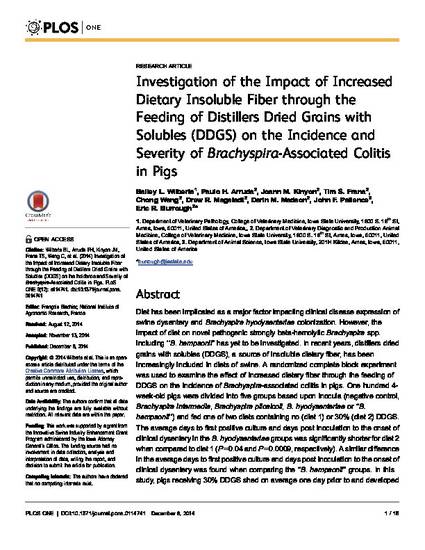
Diet has been implicated as a major factor impacting clinical disease expression of swine dysentery and Brachyspira hyodysenteriae colonization. However, the impact of diet on novel pathogenic strongly beta-hemolytic Brachyspira spp. including “B. hampsonii” has yet to be investigated. In recent years, distillers dried grains with solubles (DDGS), a source of insoluble dietary fiber, has been increasingly included in diets of swine. A randomized complete block experiment was used to examine the effect of increased dietary fiber through the feeding of DDGS on the incidence of Brachyspira-associated colitis in pigs. One hundred 4-week-old pigs were divided into five groups based upon inocula (negative control, Brachyspira intermedia,Brachyspira pilosicoli, B. hyodysenteriae or “B. hampsonii”) and fed one of two diets containing no (diet 1) or 30% (diet 2) DDGS. The average days to first positive culture and days post inoculation to the onset of clinical dysentery in the B. hyodysenteriae groups was significantly shorter for diet 2 when compared to diet 1 (P = 0.04 and P = 0.0009, respectively). A similar difference in the average days to first positive culture and days post inoculation to the onset of clinical dysentery was found when comparing the “B. hampsonii” groups. In this study, pigs receiving 30% DDGS shed on average one day prior to and developed swine dysentery nearly twice as fast as pigs receiving 0% DDGS. Accordingly, these data suggest a reduction in insoluble fiber through reducing or eliminating DDGS in swine rations should be considered an integral part of any effective disease elimination strategy for swine dysentery.
Available at: http://works.bepress.com/bailey-arruda/2/

This article is from PLOS ONE 9 (2014); e114741, doi:10.1371/journal.pone. 0114741. Posted with permission.